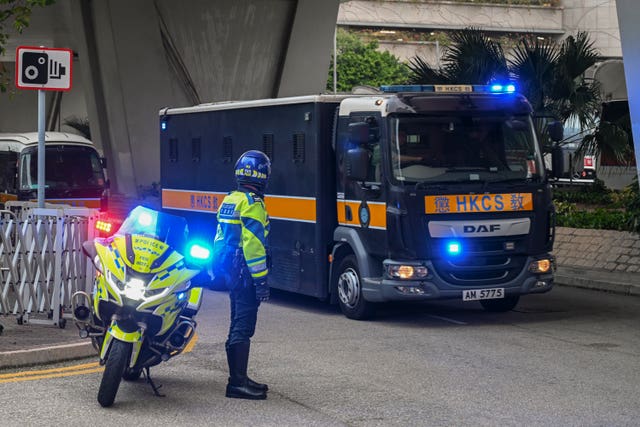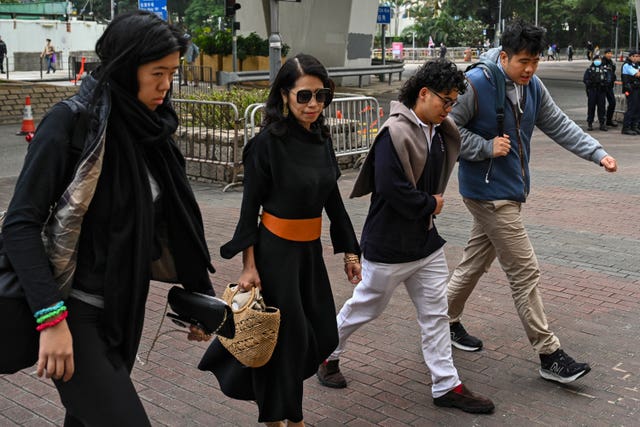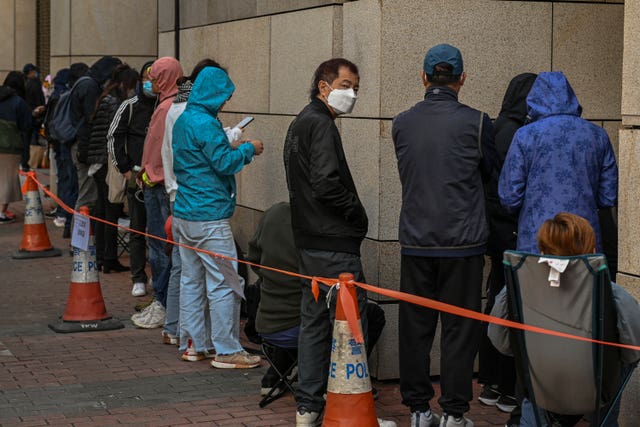[ad_1]
The 76-year-old media tycoon, who founded the now-defunct Apple Daily newspaper, was arrested in 2020 during a crackdown on massive pro-democracy protests that rocked Hong Kong in 2019.
The central government in Beijing responded by imposing a sweeping national security law aimed at stamping down opposition.
Lai has been in jail for more than three years.

His national security trial at West Kowloon Magistrates’ Courts is being closely watched by foreign governments, business professionals and legal scholars. Many view it as a trial of the city’s freedoms and a test for judicial independence in the Asian financial hub.
Lai has pleaded not guilty to two charges of conspiring to collude with foreign countries and another count of conspiring to publish seditious material.
He smiled at family members as he entered the court on Wednesday and put his hands together to show appreciation to supporters in the public gallery.
One supporter shouted “Hang in there!” and was hushed by guards.
On the fifth day of the trial, prosecutor Anthony Chau presented what he said were Lai’s instructions to senior management and editors at Apple Daily to come up with ways to urge the Hong Kong public to protest over a proposed extradition Bill in 2019.
The Bill, which was later withdrawn following protests, could have allowed suspects to be extradited from Hong Kong to mainland China, where Communist Party-dominated courts are accused of handing down convictions based on political considerations and using coerced confessions.

Prosecutors submitted 31 pieces of allegedly seditious content published on Apple Daily, including articles and commentaries as well as pages urging people to protest. Some of the material even advocated for violence in the protests, the prosecution argued.
In his commentaries, Lai alleged that the Chinese Communist Party sought to control Hong Kong via “electronic means and totalitarian machines”, Mr Chau said.
Lai had also allegedly given instructions to Apple Daily to introduce English content for the purpose of asking foreign countries to engage in sanctions against China and Hong Kong, the prosecution said.
WhatsApp messages purportedly showing that Lai had instructed editors to only concentrate on the “yellow” viewpoint – the colour of the pro-democracy camp and the “voice that the world wants to know” – were also shown to the court.
Garnering support from political leaders such as former US vice president Mike Pence, former secretary of state Mike Pompeo as well as Senator Marco Rubio via subscription to the English service would be a “protection” for Apple Daily, Lai had allegedly said in his messages.

Hong Kong is a former British colony that returned to China’s rule in 1997 under a promise that the city would retain its Western-style civil liberties for 50 years.
That promise has become increasingly threadbare since the introduction of the security law, which has led to the arrests and silencing of many leading pro-democracy activists.
The governments of both Hong Kong and China have hailed the law for bringing back stability to the city.
Hong Kong, once seen as a bastion of media freedom in Asia, ranked 140th out of 180 countries and territories in Reporters Without Borders’ latest World Press Freedom Index. The group said the city had seen an “unprecedented setback” since 2020, when the security law was imposed.
[ad_2]
Source link
